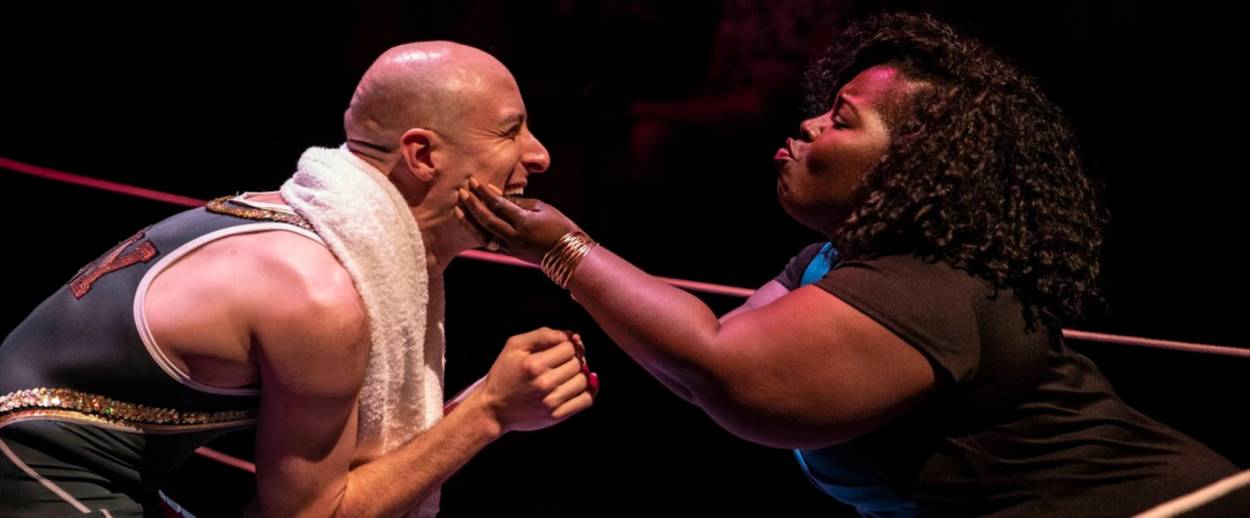The Genesis Plays Bring Biblical Heroes and Contemporary Issues to Stage
Jacob as a spandex-clad wrestling star and other modern takes on timeless Torah tales make this cycle of plays a delight




When you crave human drama, you need not look further than the Bible. With stories of betrayal, longing, and greed, the characters from the Torah—Genesis in particular—remain compelling after millennia. And now you can immerse yourself in these stories brought to new life onstage.
The Genesis Plays are a festival of five plays, works of arts created by the organization the In[heir]itance Project, running at the 14th Street Y in Manhattan. Each play is named for one or two Biblical matriarchs or patriarchs— except for poor Isaac, though he does appear in a couple as a supporting character.
The plays, directed by Chantal Pavageaux, are midrash on stage, using stories from Bereshit for both character studies and exploration of contemporary issues.
The casts are tiny, while The Jacob Play has a full cast of eight, the others have only between one and three performers. The plays are credited to Jon Adam Ross (who also performs in two), but they were developed collaboratively, each incubated in a different American city. The project also extends beyond the plays, including several community events. After each play, New York audiences are invited to write on a large piece of fabric mounted on the wall, gathering statements over the course of the plays’ run.
Each play works on its own, or you can attempt to see all five; the plays are short, between half an hour and an hour each. It adds up, but it’s still shorter than seeing Angels in America uptown.
And how do these plays take on the Book of Books? In more ways than you can imagine, and none of them in ways you might have learned about when reading these stories as kids. For example, Jacob doesn’t just wrestle with God: He stars in a full-on Wrestlemania parody, vying for the the patriarchal championship belt of the World Monotheistic Wrestling Federation. Or Sarah and Hagar are also actresses rehearsing a play as the two partners of Abraham, but they keep switching roles. One is white, and one is black, and what do modern racial dynamics mean for the ancient story?
Since there are nearly half a dozen works here, they represent a range of quality. But the standout from the five is The Rachel/Leah Play. Using video projections to integrate a documentary (by Ilana Trachtman) into the theater, the work uses interviews with real sisters to comment on the infamous Biblical women who went from sisters to sister-wives. Here, the concept works best, as the funny, complex, and moving testimonies of the real siblings remind us that there is so much more to simple hatred that must have undergirded Rachel and Leah’s relationship.
Still, Jacob appears in the flesh, but his wives do not. While the works are theoretically about the matriarchs and patriarchs alike, there are far more men present. One or two of these works even go so far as to discuss the voices of women in Biblical narratives as being obscured by men’s, but, for example, The Rebecca Play is hardly about Rivka at all, who makes no appearance but is a looming figure of authority over her twin sons. (In defense of the plays, the patriarchs are mostly portrayed as shmucks, so maybe absence is the better treatment.)
Even though these plays exist for interfaith audiences, and take inspiration from Muslim and Christian sources in addition to the Torah, they are unabashedly Jewish, both in their irreverence and points of reference. The Abraham Play, for example, is specifically about the notion of Jewish memory, and Jewish identity is organically present in The Rachel/Leah Play. But this identity isn’t limiting; the two plays are also explicitly about race, and the historic mistreatment of African Americans in the cities in which the works were developed (Kansas City and Charleston).
And so, even at times when the plays miss, they’re thoughtful, engaging, often funny. It’s worth retelling the stories of the Torah, especially when you add a body slam or two.
The festival will soon end, but the plays will all be on tap at the 14th Street Y’s Shavuot Tikkun this Saturday night, and performances of The Exodus Plays are already in the works throughout the country, including a collaboration between the Jewish Theological Seminary and formerly incarcerated New Yorkers. Will Leviticus through Deuteronomy provide enough dirt for more series beyond that? the In[heir]itance Project seems up to the task.
The Genesis Plays Festival runs at the 14th Street Y through Friday, May 18. Check website for full schedule.
Gabriela Geselowitz is a writer and the former editor of Jewcy.com.